Ecuador strengthens capacities with a gender perspective as a cross-cutting theme for adaptation to climate change
- Workshop was attended by more than 85 EbA LAC program multipliers who contribute to the articulation of institutional efforts in Ecuador.
In order to strengthen capacities to promote the mainstreaming of gender considerations in local adaptation to climate change, the regional program Scaling Up Ecosystem-based Adaptation Measures in rural Latin America (EbA LAC), in coordination with the National Plan for Adaptation to Climate Change (PLANACC) and the Ministry of Environment, Water and Ecological Transition (MAATE) of Ecuador, organized a workshop on "Gender and Climate Change".
The PLANACC encourages the development of enabling conditions for adaptation to climate change at sectoral and local levels, as well as the generation of information and, mainly, capacity building, contributing to the articulation of inter-institutional efforts to ensure the sustainability of processes focused on Adaptation to Climate Change (ACC) and Ecosystem-based Adaptation (EbA), proposed by the EbA LAC program.
"Education is the key to our progress, to sustain gender equality and appropriate actions that allow us to adapt to the impacts of climate change, which both men and women are exposed to in different ways; it is also important to raise awareness of these issues that promotes the generation of more opportunities and resources," said Yofre Ramón Mendoza Zambrano, representative of the irrigation users of the Manabí Watershed Council.

The workshop was held in the canton of Portoviejo, at the Technical University of Manabí (UTM), under the methodology of learning based on competencies and design thinking, that allows to face and solve the challenges that arise in work teams, using creativity and multidisciplinarity.
"I congratulate the EbA LAC program for bringing to Manabí the training workshop where both important issues such as gender and climate change are addressed, which should be further strengthened at the landscape and country level. To reduce these gender inequality gaps, it is important that families and households assume their important role that will generate sustainable social changes, especially in rural areas where socio-cultural aspects have more impact," said Jessica Chavez Pisco, coordinator of Climate Actions of the Decentralized Autonomous Government (GAD) Provincial Manabi.
During the workshop, more than 85 EbA multipliers from various institutions and organizations at the subnational level participated, including: Zonal Directorate 4 MAATE; Zonal Coordination of the Ministry of Agriculture and Livestock (MAG) Manabí; National Risk and Emergency Management Service (SNGRE) Manabí; Prefecture of Manabí; Municipal and parish GADs; the Universidad Estatal del Sur de Manabí (UNESUM), UTM, the Universidad Laica Eloy Alfaro de Manabí (ULEAM) and the Escuela Superior Politécnica Agropecuaria de Manabí Manuel Félix López (ESPAM MFL); producers and community leaders; agricultural associations and local gender groups; as well as leaders and representatives of the Portoviejo river basin council.
"It would be important that from the initial education of human beings, at different educational levels, as well as in projects and work in general, the analysis of gender equality, as well as the realities and needs of women and men, the impacts suffered by each one, according to the roles they carry out and the actions they must implement in their territory to adapt to climate change," said Flor María Cárdenas Guillén, research professor at the ESPAM MFL.

As part of the results achieved, it was possible to understand and interpret concepts that allow scaling up the gender approach and adaptation to climate change in the participants' jobs; contribute to inter-institutional articulation for gender mainstreaming; and strengthen knowledge and competencies in gender, as well as ACC-AbE for the sustainability of local processes.
The EbA LAC program is funded by the German Federal Ministry for the Environment, Nature Conservation, Nuclear Safety and Consumer Protection (BMUV) through its International Climate Initiative (IKI) and it is implemented by the German Development Cooperation (GIZ) as lead agency, in partnership with IUCN (International Union for Conservation of Nature) and CATIE (Tropical Agricultural Research and Higher Education Center) in three countries: Ecuador, Guatemala and Costa Rica.
